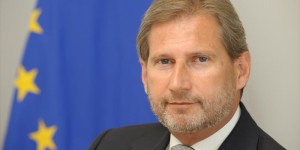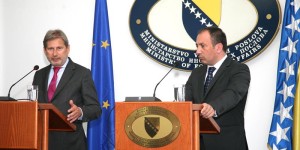I am grateful for the opportunity to provide you with the perspective of the European Union.
Let me first introduce myself. As Head of Operations of the EU Delegation to Bosnia and Herzegovina I am responsible for the financial assistance the EU is providing to prepare Bosnia and Herzegovina for EU membership.
With a team of about 70 staff, we are at present managing more than 200 on-going contracts in the value of more than 200 million euro, and preparing for the implementation of already approved projects in the value of another 160 million euro.
These projects concern all sectors where preparation for EU membership is needed, from public administration reform and support for the judiciary, to sectors such as environment, transport, social inclusion, education, employment, or civil society development.
The judiciary has been a particular important area of our assistance for many years, and will remain so in the years ahead.
Why is this sector so important for the EU?
First, the Rule of Law is the very foundation on which the European Union is built, and an independent and efficient judiciary is a prerequisite for the Rule of Law.
Second, the judiciary in any member state of the EU is playing a crucial role in interpreting and enforcing “EU Law” and this requires highly skilled and efficient judges.
Third, we know from previous accession processes that reforms in the judiciary are complex and take time and resources. Therefore, reforms need to start early in the accession process.
The Structured Dialogue on justice between the EU and Bosnia and Herzegovina and the significant financial assistance we are providing to the sector are an expression of this recognition.
Let me now give you an overview of our assistance, looking at the past and the future.
In the initial phase our support was focused on judicial independence and accountability: we supported the re-appointment process for judges and prosecutors and the establishment of the High Judicial and Prosecutorial Council (HJPC), including the Office of the Disciplinary Counsel.
The HJPC has been both a recipient of EU financial support and, maybe even more importantly, a partner for implementation of projects at the level of courts and prosecutors’ offices across the country.
The EU believes that the establishment of the single HJPC with competences to both appoint and discipline judges and prosecutors was a major achievement that needs to be safeguarded.
Under the leadership of dedicated and capable Presidents – first Judge Branko Peric and now Judge Milorad Novkovic – the HJPC has indeed managed to navigate in difficult waters and further embed, institutionalize and strengthen the independence of the judiciary.
The HJPC will continue to have the full support of the EU in this endeavour. I am saying this being fully aware that independence and accountability cannot be taken for granted, and need to be defended wherever and whenever they are under threat.
In the second phase of our support to the judiciary, since 2008, our cooperation has focused mostly on making the judiciary more efficient. The major part of the total 30 million € which we have invested in Bosnia and Herzegovina to strengthen the judiciary over the last years has been allocated for this purpose.
A core aim of our support was the gradual introduction of a modern, electronic case management system (CMS) for courts and prosecutors’ offices.
I consider it a major success that the CMS has been developed locally. The system, that all of you are using on a daily basis, is advanced and modern even in the European context!
The EU has also invested significant funds in IT equipment for courts and prosecutor offices throughout the country.
The strengthening of the efficiency of the judiciary will remain our main focus over the next several years:
– Through agreements with the HJPC, the EU will contribute to the financing of the development and deployment of the next generation of the Case Management System, as well as the modernisation of equipment in the judiciary.
– To enhance efficiency, the EU will also finance the reconstruction and renovation of a number of courts and prosecutors’ offices across the country. A total of 17 million Euro have been provided for this purpose! We are working closely with the Ministries of Justice and the HJPC, and I expect the first reconstructions to start next year.
– We will work with the Ministries of Justice to strengthen strategic planning capacities and coordination.
– Finally, the EU will provide around 14 million Euro to prosecutors’ offices and courts at all levels supporting the efficient processing of war crimes cases, including for the recruitment of additional staff.
Based on the above, our total support to making courts and prosecutors’ offices more efficient over the next years will amount to around 40 million Euro. This represents a significant reinforcement of the commitment by the EU to the further strengthening of judicial efficiency in Bosnia and Herzegovina.
We will ensure that our assistance is delivered in close cooperation with other donors active in the justice sector, in particular Sweden and Norway.
But let me also look even further ahead. We are already now reflecting on the orientation of our future assistance over the long term.
To do this we basically have to anticipate where the judiciary will be several years from now, and target our financial assistance in a way that it meets future needs.
Let me share some preliminary thoughts on this.
Generally, I would not expect that support to Information and Communication Technology will remain a mainstay of our assistance over the long term. After the development and deployment of the new CMS will have been completed, we would expect the national budgets to finance both future operational costs and capital expenditure related to the use of information and communication technology.
The same goes for investments in buildings where we would expect governments at all levels to shoulder the necessary burden.
I believe that an important area for our support over the long term will be what could be called “justice for growth”.
The rule of law needs to provide a stable framework in which economic activity can thrive, with corruption and organised crime being held in check. And as Bosnia and Herzegovina will get closer to EU membership, it will be necessary to prepare the judiciary for challenges resulting from the participation in the internal market of the EU and on how courts can contribute to economic growth in Bosnia and Herzegovina. This will thus require more specialized assistance relating to commercial cases as well as investigation and prosecution of economic crime and corruption cases.
Likewise, and in line with the developments within the EU Member States, I expect that IPA assistance will focus increasingly on what can be called “justice for citizens”. This expression underlines that the judiciary ultimately is to serve the citizens.
I would like to mention in this context that the European Commission has introduced a scoreboard ranking of the services of the judiciary vis-à-vis their citizens and the business community. Access to justice through legal aid or the use of mediation in civil cases are examples of areas where progress can be made.
We should also recognize that Rule of Law requires the entire “chain of justice” to be functional. As the capacity of prosecutors’ offices and courts to process criminal cases has increased, we have seen that the system for enforcement of criminal sanctions has been lagging behind. To address this issue it is necessary to expand prison capacity and further develop the regime of alternative criminal sanctions.
Assuming that the current political blockages to EU financial assistance are overcome, the European Commission will enter into a dialogue with the relevant authorities in BiH to jointly reflect on the future strategic priorities for EU financial assistance to the sector. I would like to encourage Ministries and Justice and the judiciary to prepare for and actively participate in this reflection.
Please allow me to conclude my speech now with a few personal words.
Notwithstanding the slow pace of overall reforms, I sincerely believe that the reforms and the achievements in the judiciary over the past decade have indeed been significant. The independence of the judiciary has been embedded and defended. Lack of efficiency remains a major concern, but the ground is prepared to achieve a significant reduction of the backlog of cases over the coming years. The EU will assist in this effort.
In closing my speech I would like to express my appreciation to all in this room who have contributed to the achievements made. And I would like to assure you of our determination, politically and financially, to assist you in further reforms and continue our close cooperation.
end



